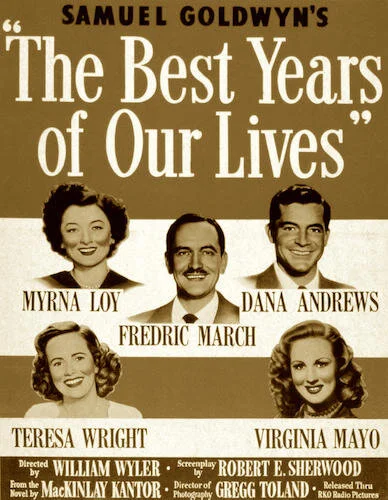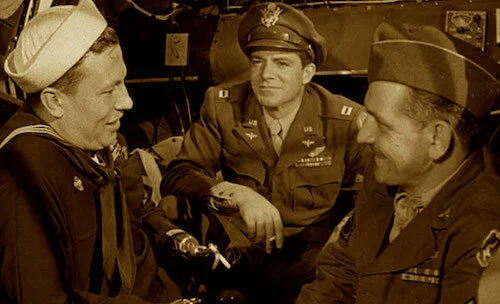The Best Years of Our Lives
This review is a part of the Best Picture Project: a review of every single Academy Award winner for the Best Picture category. The Best Years of Our Lives is the nineteenth Best Picture winner at the 1946 Academy Awards.
We have reached William Wyler's second Best Picture film, and it's the massively sentimental The Best Years of Our Lives: the arrival of three vastly different World War II veterans, and integration back into society. The timing couldn't have been more perfect. World War II was finished in 1945. One year later, this three hour domestic epic reaches all walks of life, as to help households deal with the post-war repercussions that may have been lingering. These include post traumatic stress disorder, lovelessness, and physical and mental disfigurement, all in the name of fighting for one's country.
There are many notable names here, including Fredric March, Myrna Loy, and Theresa Wright. The film was also noteworthy for having a non-actor with a disability have a starring role (Harold Russell would go on to win Best Supporting Actor). Wyler was clearly trying to focus on what messages could reach his audiences, more than what he would love to use to allow his film to dazzle. The goal was to feature three households (in ways), and have these various stories that all stemmed from one opening scene. No matter how far the three lead characters diverged from the war, their horrors still followed them and affected them.
Three war veterans of different outfits, ready to take on the return back home.
The longer Years goes on for, the more it kind of gets lost within its own plot threads. I'm not raising this as a complaint, but just a precaution. For me personally, Years meanders a tiny bit much, but I always am thankful for these scenes after the fact. Maybe the middle portion molds together enough to not render all of its separate elements distinguishable from one another. It kind of matters in a three hour film, where you want to feel every ounce of what these veterans are going through. I understand why these scenes are here, but the second third often slows down heavily for me.
Even though the ending is Hollywood heavy, I'm grateful that it is. After so much time invested in wanting the best for these struggling men of war, it's only fair that they get a break. Besides, isn't that what the film is all about? It's the prophecy of the years of healing that are ahead, with loved ones there to help them. Even if the three stories lose a bit of steam when they have to compete with one another, it's the end game that boosts each plot thread into becoming a more realized narrative.
Harold Russell’s performance won him an Academy Award, though he would only go on to star in four other projects for the rest of his life.
The Best Years of Our Lives is an honourable experiment with zero signs of synthetic sympathy. It's a noble cause during a time when a war had just ended, but the next phase had only begun. It takes pride in using its warm cast to uphold the straight forward screenplay. William Wyler didn't try to over complicate this film, and it's a very wise decision. Back then, Years helped to provide a space to discuss the answers to hard hitting worries. Now, Years is a strong-enough attempt, that any newcomers can relive the collective mindset of an anxious America, during a time when our life partners and family members needed us the most. War continues to this day, so this is a situation millions of loved ones experience still. Years still has enough healing power to help, because of its level headed priorities, and it ends up being a therapeutic exercise.
Andreas Babiolakis has a Masters degree in Film and Photography Preservation and Collections management from Ryerson University, as well as a Bachelors degree in Cinema Studies from York University. His favourite times of year are the Criterion Collection flash sales and the annual Toronto International Film Festival.






